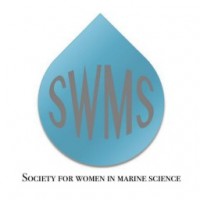Featured Stories | October 21, 2015
Empowering Women in Marine Science
By Cassie Martin
The second annual workshop of the Society for Women in Marine Science (SWMS) took place at MIT on October 10, 2015. A diverse mix of nearly 50 women in science at various stages of their careers—from graduate students eager to build a community to senior scientists who are still the only senior women in their departments—gathered to share research and discuss issues facing women in marine science and STEM fields in general.
Making Science Accessible
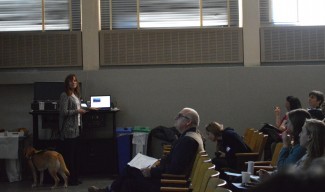
In the keynote address, Amy Bower, a physical oceanographer at Woods Hole Oceanographic Institution (WHOI), shared her experiences as a female scientist in a largely male-dominated field and as the only vision-impaired scientist in her workplace. “It can be sort of debilitating, so I just tackle problems as they come day by day,” said Bower of her diagnoses of macular degeneration and retinitis pigmentosa—progressive eye diseases which have left her legally blind.
Thanks to assistive tools, Bower is still able to do all of the things required of a physical oceanographer—going on expeditions, collecting and analyzing data, giving presentations—but it required asking for help. “I was embarrassed and tried to hide it at first, but that wasn’t fair to me or others. It’s much better to be upfront,” she said. “Once I asked for help, I felt more empowered. WHOI has been wonderful and extremely supportive, but I’m the only person there with my disability. I keep going to WHOI because I want to keep their feet to the fire, keep them accountable.”
Today, Bower is helping blind and visually impaired students discover careers in science through her outreach program OceanInsight. “[These students] have been left out of cool programs like Dive and Discover, Science in the Classroom…” Bower said. “[OceanInsight] brings the excitement of ocean research to these students.” The program provides mentorship and demonstrates the accessibility of careers previously thought unattainable. In past years, students from the Perkins School for the Blind have taken tactile field trips to WHOI where they touched Alvin, one of the world’s first deep ocean submersibles, and learned about research. A teacher from the school even joined an expedition out to sea, reporting her experiences back to the students. “They’re flabbergasted to meet adults who use the same tools they’re learning. Including blind and visually impaired students is not rocket science, it’s just a new group.”
As a visually impaired female scientist, Bower has faced plenty of hurdles—from inaccessible physics professors in undergrad to finding the courage to ask for help with her disability to dodging Somali pirates’ grenades during an expedition—but they haven’t squelched her love of science. “Find something you’re passionate about,” she said. “Because you’ll need the energy from that to push through obstacles, whatever they may be.”
Navigating an Ocean of Uncertainty
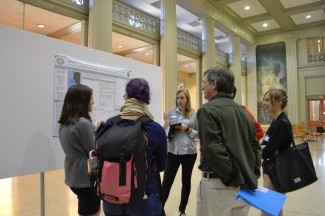
Following Bower’s talk, attendees gathered for a poster session in Morss Hall. “We designed this year’s workshop as a research symposium,” said Deepa Rao, an MIT/WHOI Joint Program student. “It’s a place for female scientists at all levels to share and support research,” she said. Twelve graduate students presented a diverse range of research, including invasive lionfish genetics, carbonate chemistry in aquatic environments, and paleo-hurricanes, among other topics. Students relished the opportunity to share their work with colleagues, both male and female. One of the five men who attended the workshop, MIT graduate student Cael Barry, said, “I’m an activist outside of work for other communities facing similar issues. I knew it was important for me to be here to support this community as well. Women’s issues are everyone’s issues, they affect all of us.” Later, guests listened as their peers recounted first-hand experiences of these issues and how they worked through them.
The first group of invited speakers provided insights for female scientists at different stages of their careers. Heidi Sosik, a WHOI senior scientist; USGS postdoc Meagan Gonneea; and Michele LaVigne, an Assistant Professor at Bowdoin College, related their experiences and what they learned as researchers in diverse working environments. The skills of a successful female scientist, they said, include cultivating and maintaining supportive personal and professional relationships, setting priorities, learning professional negotiation skills, advocating for oneself, and being able to say no. Most importantly, they echoed Bower’s message of passion and emphasized cultivating independence and ingenuity along with it. “We’re in the ocean. There are no roads, we can go wherever we want!” said Gonneea.
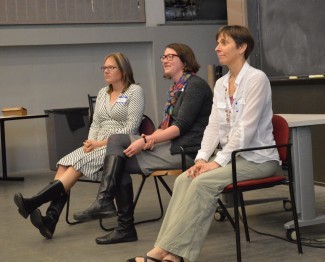
But the path to a successful careers as a senior research scientist or professor, for instance, comes with unique challenges. The final two speakers, University of Connecticut Assistant Professor Julie Granger and WHOI Senior Scientist Amala Mahadevan, gave advice for navigating the interview process and related an intensely personal story of balancing a family while trying to build a science career, respectively. Their experiences may have been different, but their message was the same: happiness matters, and don’t be shy to ask for what you need.
Building a New Culture of Science
In a follow up panel discussion featuring Meg Tivey, associate dean of the MIT/WHOI Joint Program; Amy Bower; Rick Murray, National Science Foundation Division Director of Ocean Science; and David Smith, associate dean of the University of Rhode Island’s Graduate School of Oceanography, attendees were given the chance to voice those needs. Calls for expanded daycare subsidies, increased use of family-friendly policies, transparent hiring policies and actions to combat the gender wage gap were just a few suggestions. The panel also addressed how to accommodate two-career couples, gender non-conforming, and minority applicants, and the problem of imposter syndrome—when a young woman feels like she doesn’t belong or isn’t good enough, based on a perception that she made it into a lab because of affirmative action.
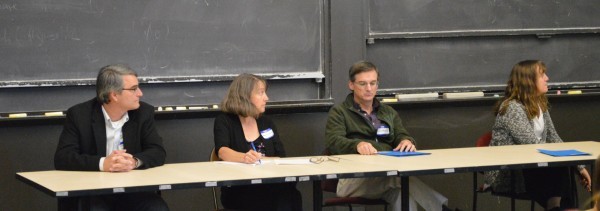
The onus for retaining female scientists in STEM fields shouldn’t fall solely on women’s shoulders. Institutions can take decisive action to support women and build confidence based on merit, not charity. Panelist David Smith described changes the University of Rhode Island made to recruit and retain more female scientists, including allocating more money to hire women and support research during their first three years, instituting a flexible tenure clock policy to support scientists with families, and assigning mentors in and out of scientists’ respective fields. “It changed the face of our faculty overnight,” said Smith. “From a science output, it didn’t change anything. They all produce top notch research.”
The workshop ultimately mapped the complex challenges and solutions for women in marine science and other minority communities. Panelist Rick Murray summed up the day’s definitive message: “People have to feel comfortable across the spectrum before they can do good science. A little bit of effort goes a long way toward building new cultural traditions.” Indeed, the Society for Women in Marine Science’s efforts are no doubt helping to create an inclusive and supportive environment for all.

